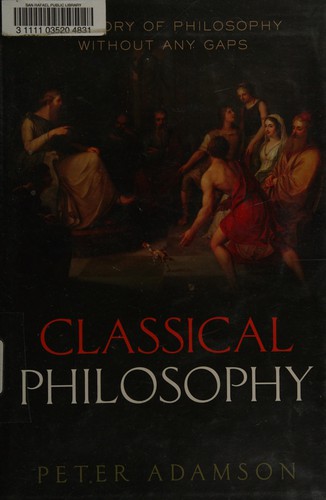UdeRecife reviewed Classical philosophy by Peter Adamson
Review of 'Classical philosophy' on 'Goodreads'
5 stars
What makes this a great history of philosophy is precisely its “without any gaps approach”. This because, as Peter Adamson himself recognizes on the last section of this book, if you’re studying philosophy in, say, an undergraduate course, and you’re doing the usual flyover on the whole history of the great philosophers that are most of your classes, usually “you might reasonably expect to jump from Aristotle to, perhaps, Descartes, leaping over about 2,000 years of history in the process” (ADAMSON, 2014). Yes, time is short and there’s too much of the good stuff to cover without having to deal with what most histories deem the minor thinkers.
This is unfortunate, because with such huge gaps in the narrative, you get the impression that some of the thinkers, or their ideas, just come out of the blue, making them seem more extraordinary than they really were.
Well, not in …
What makes this a great history of philosophy is precisely its “without any gaps approach”. This because, as Peter Adamson himself recognizes on the last section of this book, if you’re studying philosophy in, say, an undergraduate course, and you’re doing the usual flyover on the whole history of the great philosophers that are most of your classes, usually “you might reasonably expect to jump from Aristotle to, perhaps, Descartes, leaping over about 2,000 years of history in the process” (ADAMSON, 2014). Yes, time is short and there’s too much of the good stuff to cover without having to deal with what most histories deem the minor thinkers.
This is unfortunate, because with such huge gaps in the narrative, you get the impression that some of the thinkers, or their ideas, just come out of the blue, making them seem more extraordinary than they really were.
Well, not in Adamson’s History. The key feature here is really his “without any gaps” approach. This is what makes this a must-be companion for all who truly want to know how ideas came to be in the first place.
So, if you’re a history of philosophy buff like me and you really want to know as much as possible about the minor things leading to the great ones, this is definitely a must-read for you too.
From almost every conceivable minor thinker to the big, big ones, where you also get to see not only all the great, but also the smaller things they thought, said and done; from the great men (for they are usually only men) to the great women; from the usual great biographical moments to the tiniest details that make up the perfect conversation starters at parties, nothing here is left out. For this is truly A History of Philosophy Without Any Gaps.

